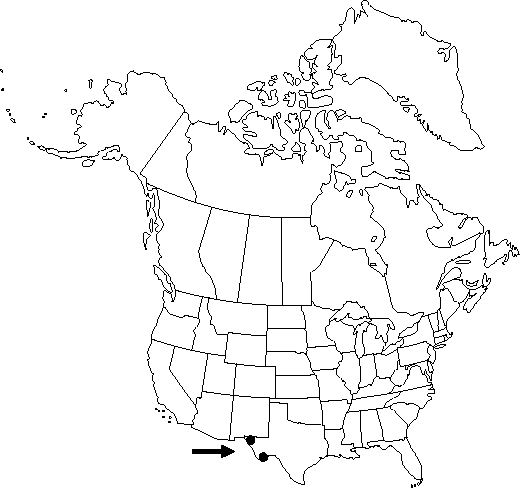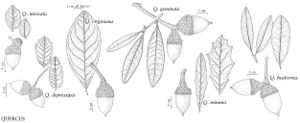Quercus intricata
Mem. Natl. Acad. Sci. 20: 84. 1924.
Shrubs, evergreen, clonal, intricately branched. Bark gray, scaly. Twigs gray- or yellow-tomentose, darkened, 1-1.5 mm diam., persistently pubescent for several seasons. Buds dark reddish brown, 1-1.5 mm, apex round, sparsely pubescent to glabrate. Leaves: petiole 2-3 mm. Leaf blade oblong, sometimes ovate, often strongly cupped, 10-25 × 5-13 mm, extremely thick, leathery, base cuneate to cordate, margins very coarsely revolute, often undulate-crisped, entire, rarely with a few teeth, secondary veins 8 or 9 on each side, apex acute or obtuse; surfaces abaxially brownish or buff, persistently tomentose with erect curly hairs, rarely glabrate in 2d season, midribs (and sometimes principal veins) glabrous and brown against tomentum, secondary veins sometimes prominently raised, usually obscured by tomentum, adaxially dark or gray-green, lustrous, sparsely or moderately stellate-pubescent, secondary veins impressed. Acorns solitary or paired, subsessile or on peduncle to 15 mm; cup deeply cup-shaped, 7-8 mm deep × ca. 10 mm wide, base round, margin thin, scales ovate or narrower, proximally canescent-tomentose, moderately or markedly tuberculate, tips closely appressed, reddish, thin, nearly glabrous; nut light brown, ovoid, 9-12 × 8-10 mm. Cotyledons connate.
Phenology: Flowering spring.
Habitat: Open chaparral and pinyon-oak woodland, on dry, rocky, limestone slopes (in Mexico also on gypsophilous soils)
Elevation: 1500-2500 m
Distribution

Tex., Mexico (Coahuila, Nuevo León, Durango, and Zacatecas).
Discussion
Quercus intricata, a fairly common element of the mountains of the Chihuahuan Desert region, is known in the United States only from two localities: a population in the Chisos Mountains and another in the Eagle Mountains of west Texas.
Selected References
None.
